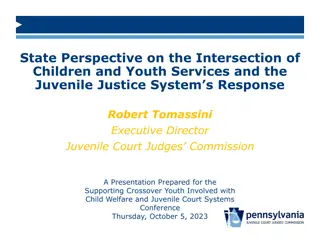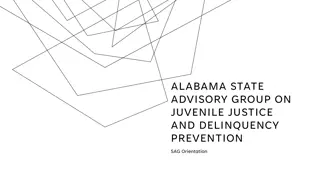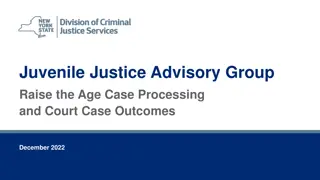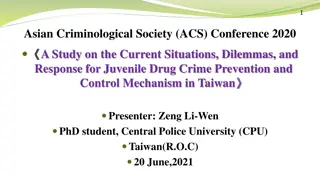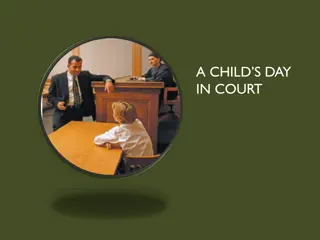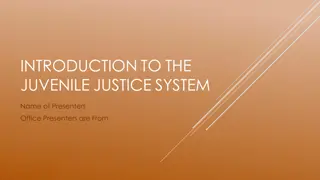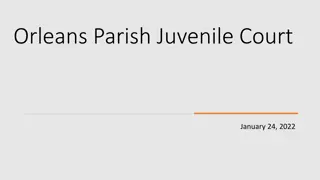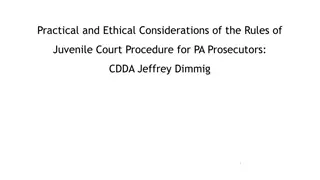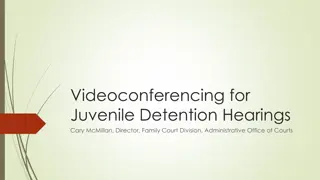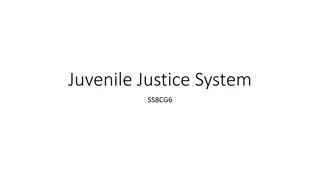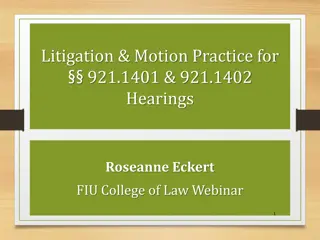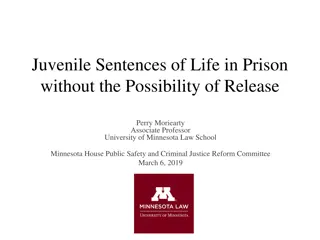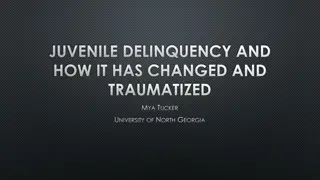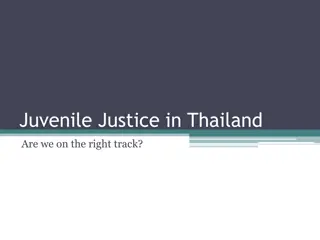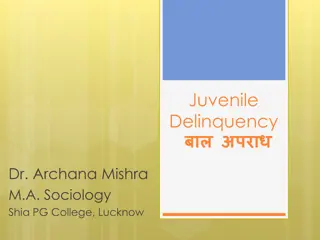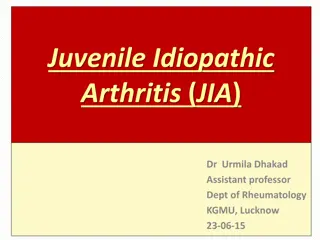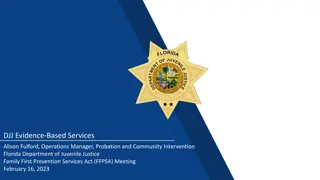Understanding the Juvenile Court System: Roles, Responsibilities, and Best Practices
Explore the Juvenile Court System, its philosophical foundations, critical definitions, legal issues, custody requirements, investigative procedures, and best practices for managing juvenile cases. Delve into historical perspectives, statutory obligations, restorative justice principles, and distinctions between juvenile and adult justice systems.
Download Presentation

Please find below an Image/Link to download the presentation.
The content on the website is provided AS IS for your information and personal use only. It may not be sold, licensed, or shared on other websites without obtaining consent from the author. Download presentation by click this link. If you encounter any issues during the download, it is possible that the publisher has removed the file from their server.
E N D
Presentation Transcript
1. Discuss the Juvenile Court System and the basic philosophical tenets that guide the courts. 2. List the critical definitions in the Juvenile Court Process. 3. Identify the roles and responsibilities of the various entities and stakeholders in the Juvenile Court process.
4. Define the basic legal and jurisdictional issues in the Juvenile Court system. 5. Define custody requirements and limitations for law enforcement dealing with juvenile suspects and offenders. 6. Define basic requirements regarding investigations of child abuse and neglect.
7. Identify basic requirements for investigations of delinquent acts and juvenile misconduct. 8. Define best practices in managing juvenile investigations, interrogations and report writing. 9. Demonstrate a working knowledge of disproportionate minority contact within the juvenile justice system.
Historical Perspective Mary Ellen Wilson In re Gault 300px-McCormack-MaryEllen_001a
Statutory obligation Section 211.011 RSMo Facilitate care, protection and discipline Best interest of the child Secure equivalent care to that of which they would receive from a parent
Restorative Justice Community Safety Offender Accountability Competency Development Evidence Based Services
Developing person No particular set of values/pattern of behavior Amenable to treatment Able to change
Juvenile vs. Adult Systems
Differences Philosophy Terminology Procedural
ADULT SYSTEM JUVENILE JUSTICE SYSTEM Criminal Act Arresting Jail Information, Indictment, Complaint Trial Conviction Sentence Probation Prison Sentence Delinquency Taking a juvenile into custody Detention Petition Hearing Adjudication Disposition Supervision Commitment to Division of Youth Services Counsel for Juvenile Officer Deputy Juvenile Officers Prosecutor Probation Officers
Commonalities Offender accountability Serve the public Community Safety Due process protections
The Importance of Law Enforcement Law Enforcement serves as the doorway to the juvenile system for a young person alleged to have committed an act of juvenile misbehavior or delinquent conduct.
Juvenile Delinquency Commission of act(s) by a minor child that would be a Crime(s) if committed by an adult See BLACK S LAW DICTIONARY 385 (5THED. 1989)
Involving any child who is alleged to have violated a state lawor municipal ordinance, or any person who is alleged to have violated a state law or municipal ordinance prior to attaining the age of seventeen years, in which the child or person resides or may be found(within ___ County) or in which the violation is alleged to have occurred (within ___ County) Missouri Juvenile Code: Section 211.031.1(3) RSMo.
Authority 1. AGE Exclusive Jurisdiction of the Juvenile Court: Birth to seventeen years of age (not including seventeen years of age) OR Act was committed by the person prior the age of seventeen years. Sections 211.031.1(3) and 211.041 RSMo.
Authority 1. Age; AND Exclusive Jurisdiction of the Juvenile Court: #2 Presence of Child/Act RESIDES WITHIN COUNTY child takes on the residency of the parent; if divorced then parent with actual physical custody Section 211.031.1(3) RSMo.; In the Interest of R.P., S.W. 2d 292 (W.D. Mo.Ct.App. 1998); OR FOUND WITHIN COUNTY actual physical presence See Section 211.031.1(3) RSMo.; In re Jackson, S.W.2d 320 (S.D. Mo.Ct.App. 1979).; OR 966 592 OFFENSE COMMITTED WITHIN COUNTY See Sections 211.031.1(3) RSMo.; AND
Authority 1. Age; AND 2. Presence of Child/Act; AND Exclusive Jurisdiction of the Juvenile Court: #3 Probable Cause to believe that the juvenile committed a delinquent act Probable Cause exists where the facts and circumstances would warrant a person of reasonable caution to believe an offense was committed or is being committed. See Black s Law Dictionary (6th ed. 1990)
Traffic Offenses August 2012 15 years of age, non- felony Municipal Curfew Violations Tobacco Possession or Use
Columbia Police Department (Boone County) investigates a rash of burglaries in Columbia. 15-year old Ken Smith whose parents reside in Camdenton (Camden County) is taken into custody in Cole county and admits his involvement in the Columbia burglaries Which county has jurisdiction? Why?
Miranda warning requirements does not apply to DWI or other non-felony traffic offenses, because the juvenile is not subject to the Juvenile Court jurisdiction. However, failure to give a Miranda warning may impair authorities ability to use the juvenile s statement.
Liasion to Court Advise of Rights Authorize Detention/ Protective Custody Case Management
Evidence Investigation Reports Authorize Protective Custody
Law Enforcement serves as primary investigator of any criminal conduct or delinquent behavior by a juvenile. Sleuth4
BEYOND A REASONABLE DOUBT JUVENILE OFFICER MUST PROVE EACH ELEMENT OF OFFENSE AN INVESTIGATION OF SAME LEVEL OF SUFFICIENCY AS IN ADULT COURTIS NEEDED In re Winship, 397 U.S. 358 (1970); In re V.F.S., 172 S.W.3d 887(Mo.App.S.D. 2005).
Standard 2.2(E) says. The juvenile officer shall require referrals relating to allegations of a delinquent act to include an investigation by law enforcement. Standard 2.2(D) says The juvenile officer shall make a written request of the referring party for additional investigation or information necessary to determine sufficiency of the allegation in the referral
Standard 2.2 (G) says The juvenile officer shall provide, in writing, to the referring party or person the reason the referral is not sufficient to establish or warrant action by the juvenile officer
CUSTODY POWERS 1. 2. Order of the court; AND Laws of arrest applicable to adults A.K.A. - Probable Cause Rule 127.01
The order by the court to take a juvenile in to custody may be in the form of: Summons; Capias; Pick-up order; Juvenile warrant; or Other written order by the court Section 211.101.3 RSMo.; Section 211.121 RSMo.
The taking of a juvenile into judicial custody IS NOT an arrest. Rule 127.01(b) and Section 211.131(2).
All necessary means, including reasonable force, in the process of taking a juvenile into custody. Walsh v. Oehlert, 508 S.W. 2d 222 (Mo. App. E.D. 1974 TrafficControl3
Jurisdiction of the court attaches: When the juvenile is taken into judicial custody . Rule 127.01 and Section 211.131(3).
What is Judicial Custody? Handcuffs In patrol car Side of the road Principal s office Law Enforcement Station
"Judicial Custody" "Judicial Custody" Taking of Physical Custody Retention of Physical Custody Rule 110.04(10)
Required information includes: Full name Social security number Date of birth Address Telephone number Physical description Name of the parents and/or legal custodian Address of the parents and/or legal custodian Section 211.411 RSMo.
Immediately notify the Juvenile Division that the juvenile was taken into custody. See Rule 127.02.
Make reasonable efforts to notify the juveniles custodian. Reasonable efforts - efforts an ordinarily careful, prudent, and diligent person would make under the same or similar circumstances. See Rule 127.02 and Section 211.131.2 RSMo.
Juvenile Officer to Release to Custodian UNLESS Substantive Reasons exist to Detain See Rule 127.02, 127.07, and Section 211.141.1 RSMo.
Corrective or punitive measures (felony mouth) Behaviors associated with mental illness Solely for investigative purposes
Bodily injury Weapons Sexual offenses Flight risk No appropriate custodian (limited situations)
Court Operating Rule 28 -Effective January 1, 2012, all Juvenile Officers and Detention Intake Staff shall use the JDTA in determining whether to place juveniles in secure detention.
When juvenile presents a risk to public safety May fail to appear in court for their hearing
If detention authorized by Juvenile Officer... Juvenile should be transported to the authorized juvenile detention facility for your jurisdiction.
STOP A juvenile can not be held in a jail or other adult detention facility. Rule 127.03 and Section 211.151 RSMo.
Detention or Conditional Release Up to 24 Hours Rule 127.01, 127.04, 127.06, 127.07 and Section 211.141 RSMo.
If detained.... Law enforcement MUST complete a Probable Cause Statement, as soon as possible or within 12 hours. See Rule 127.02




